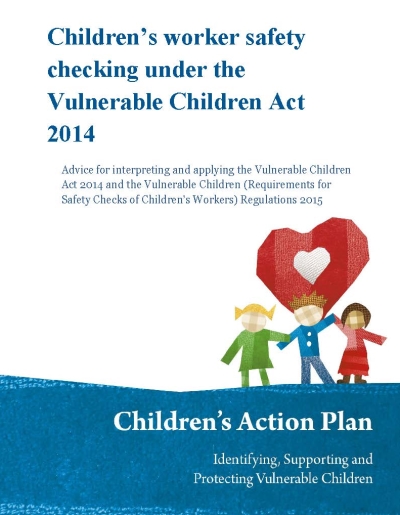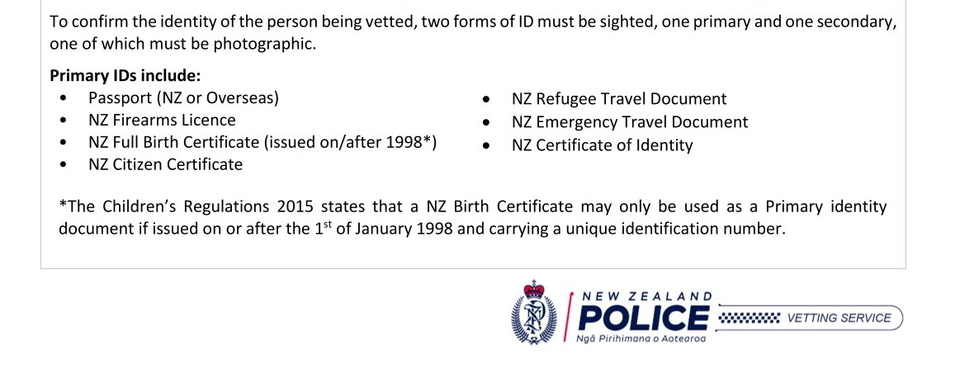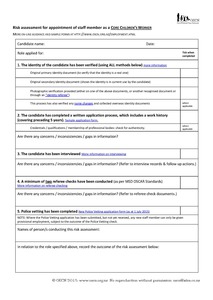Quick links
The staff risk assessment form
Interview guidelines
Sample interview questions
Referee checking
Background checking for staff from overseas
 Staff Safety Checks Under the VCA
Staff Safety Checks Under the VCA
Guidelines for Risk Assessment
Extracted from “Children’s worker safety checking under the Vulnerable Children Act 2014” (Children’s Action Plan, May 2015)
“During the process of safety checking, these principles should be followed:
• Safety checking is about using professional judgement to identify patterns of concerning attitudes or behaviours. These patterns can be subtle, and people conducting safety checks should be considering information holistically, rather than only looking for narrow indicators like the presence (or absence) of relevant criminal convictions
• Indicators should always be considered in context. A criminal conviction, gaps in employment history, or a negative reference can have different significance depending on the context. People should be given the opportunity to respond to concerns about their suitability.
• Following-up on potential indicators is important. For example, if people talk about rehabilitation, the interviewer should ask for evidence. Possible evidence in this case may include programmes entered into, periods without re-offending and the name of a qualified person who can testify to the children’s worker’s suitability to work with children.
• In addition, safety checking must always be done in accordance with existing legal protections. Specified organisations must be aware of their obligations under the Privacy Act 1993, the Human Rights Act 1993, the Employment Relations Act 2000 and (if relevant) the State Sector Act 1988.
• The VCA does not (except where the Workforce Restriction applies) require that specified organisations take any action in response to information you gather, or make any particular decision. The final decision about whether a person is safe to work with children remains the sole responsibility of the specified organisation, who should act at all times in the best interests of children accessing the service.
• This final decision may be based on a range of factors. Ultimately the decision maker should be satisfied that the children’s worker would pose no undue risk to the safety of children if employed in engaged. Decision makers should consider whether they need to seek outside expert advice, further referees (or seek more information from previously contacted referees) and to raise any issues with the children’s worker, including where information is unclear or inconsistent.”
When there are inconsistencies, omissions or other concerns the severity of these need to be taken into consideration. Where they are serious it is likely that you will not go any further with this candidate. Where matters appear less serious it could be appropriate to meet with the candidate and give them a chance to explain why there has been this omission or this matter has come to your attention.
It may even be that the candidate contests the information you have obtained. They are entitled to take this concern up with any vetting body that provided the information.
If you still have any doubt or ongoing concerns it is recommended that you seek more expert advice, talk further to referees, consult with colleagues etc. before going any further with the candidate. Do not rush any decision to offer employment.
In making your final decision, consider these questions:
• Is the person safe to be working with children?
• Will they act appropriately to ensure children’s needs are met? Do they have a sound understanding of children’s development?
• Do they have a personal commitment to act on any issues of child safety as a matter of priority?
• Will they take an active role in upholding all your programme safety and child protection practices, and follow all your procedures?
Adapted from “Safer Recruitment Safer Children” page 47 (Child Matters / Children’s Action Plan)
The Risk Assessment Form
The end point of safety checking process is a risk assessment of the candidate’s suitability to take on a children’s worker role in your organisation. The Risk Assessment checklist is a suggested format for this process and covers each stage of the safety check. This form should not be seen as the only required documentation. It simply provides a summary form to give an overview of the outcomes of the other checks and processes, including, importantly, any concerns and/or gaps in information for that candidate.
Download the risk assessment form
NOTE: The form includes links to the extra information on this page. For these links to work you will need to logged in to the OSCN web-site. Once you are logged in, go back to the form, then click on any link in the pdf file to take you to the relevant section.
The sections below refer to specific sections on the form (links on the form bring you back here).
Confirming Identity
This information is from the NZ Police: User Guide to the Police Vetting Consent Form


Obtaining an identity referee
Guidelines on this option, should there not be a photographic ID available are provided in “NZ Police: User Guide to the Police Vetting Consent Form”

Return to the risk assessment form
Name changes
"If the two identity documents provided have different names (e.g., a birth certificate contains the applicant’s maiden name and a driver licence contains their married name), evidence of a name change must be sighted such as a marriage certificate or statutory declaration." NZ Police
There are various forms that may be provided as evidence, usually issued by Department of Internal Affairs or Ministry of Justice. These could include NZ marriage or civil union certificate, change of name by statutory declaration or deed poll, NZ name change certificate, NZ order dissolving marriage or civil union etc.
Application form
Link to sample application form (pdf document - or word version will download here)
It is not advisable to just accept a CV by way of application, The use of a written application form is highly recommended. Check the information in the application form and CV against other information you are given about the candidate.
Be aware of gaps or potential omissions in information – enquire about these in the interview / check with referees. Follow up on qualifications where you don’t recognise the awarding body. Look for possible work pattern concerns – movements to different areas, short term positions, or if it's unclear why a position was left. Enquire further and clear up any inconsistencies.
Where there is a disclosure of criminal offending, assess this on a case by case basis, keeping in mind workforce restrictions. Look at the information in context: how long ago, circumstances, evidence of rehabilitation etc.
Return to the risk assessment form
Interviewing
link to a pdf version of this section
The following information has be adapted to an OSCAR context from “Safer Recruitment Safer Children” (Child Matters / Children’s Action Plan) pages 23-27.
During the interview process you will be able collect important information and impressions about the candidate.
• It’s essential to have well-thought out questions and a clear idea what each question is trying to determine.
• Ask questions to check information given at the application stage and fill in any gaps.
• Be ready to ask follow-up questions to reach the information you are after and to discuss more sensitive topics around child safety.
• At least two people should conduct all interviews for core children’s workers, so as to base judgments on more than one perspective.
• Consider how you can help the candidate to be comfortable and relaxed – this may help you get a truer impression of their personality and manner.
• You may wish to conduct a second interview to follow up on anything that arises in the referee checks and other background screening.
Empathy, respect and kindness towards children are all positives in a potential staff member. Most OSCAR services like to have a friendly and informal culture within their programme but this must be underpinned by firm professional boundaries, a strong commitment to child protection, and a good understanding of children’s developmental needs.
In general you will be making judgements in an interview about
• the attitude the candidate has towards children, especially matters around control and discipline
• the candidate’s open-ness and willingness to discuss sensitive topics, past behaviour and issues around child mistreatment and abuse
• the awareness and commitment shown by the candidate to actively promote good child protection practices in the workplace
Be aware of any impressions you get that
• the candidate is withholding information or has a secretive or deceptive nature
• there is a lack of awareness about what is appropriate around children
• any indications of poor personal / professional boundaries e.g. “I just want to be their friend”
Guidelines for interview questions
The interview should be based around prepared questions. For some questions it is advisable to prepare follow-up questions that allow responses to be opened up to more scrutiny and depth.
• Open-ended questions can provide a wide range of useful responses and impressions.
• Closed questions are useful for getting definite responses that may open up further lines of questioning.
The examples below illustrate these different approaches.
An open question will invite the candidate to describe and explain. e.g.
• "Based on your experience in children’s services, how do you approach building a positive relationship with children?"
• "Tell us about a rewarding experience you have had, when working with children."
• "One of our important policies is that staff avoid situations where they are alone with a child. Could you tell us why that is important?"
Be ready to ask follow up questions, 1) where the answer is quite general and could be explained further to make the meaning clear or 2) you feel like there is more that the candidate could tell you. e.g.
1) "What values do you consider important, for working with children?"
Examples of follow up questions:
• candidate answers, among other things with the word “respect”. Follow up question could be “Can you tell us more about how you view respect?”
• more generally, a follow up could be: “Those seem like very worthwhile values. Which values do you feel personally, are most important?” [then] “Why that one in particular.”
2) "Can you tell us about a situation where you have had to help a child who is very upset or angry?"
Examples of follow up questions:
• “How did the child respond to that?”
• “What was the outcome for the child?"
• “That seems like a good approach. Did it work? ….. Why do you think it worked?”
• “Are there skills you would like to develop, to be more effective in these sorts of situations?”
A closed question usually invites a limited “yes or no” type answer. The question might start with “did” or “have”. In general you want to ask less of these.
• “Have you ever had a complaint made about how you conduct yourself in the workplace?”
• “Has anyone ever made a complaint about how you have treated a child?”
If the answer is “no”, have a follow up question ready…
• “Can you tell us about a situation where you have felt tested or challenged by a child’s behaviour or attitude.”
• “Can you tell us about a time where you wondered if a complaint might occur, because of how you treated or responded to a child.”
Behavioural questions vs. "what ifs...."
Behavioural-based questions are based on the idea that past behaviour is the best indicator of future behaviour. Be aware of the “what would you do if…..” style of questioning, that usually leads to a hypothetical answer. e.g.
• "How would you deal with 2 children who were fighting over a toy?" (hypothetical situation)
better to ask....
• "Tell me about a time when you have had to resolve a conflict between children?" (specific/behavioural question)
When candidates are talking through real situations they have been in:
• you are more likely to get an insight into their true character
• you can follow up with more probing questions that elaborate on important elements (e.g. talk me through why you did that? or how did the child respond when you said that?)
• it may become apparent, if the candidate is not being entirely honest or transparent.
• If the candidate can’t recall a specific situation, then a hypothetical answer might have to do, but a persistent lack of recall about common, real situations might need further follow up to check the candidate’s real work experience.
A few other warning signs
• Responses where you ask for more detail, but answers remain or become vague, especially if you were discussing a past experience. Is the candidate being truthful, or concealing something?
• A candidate who sees themselves very differently from how others describe them (e.g. referees)
• Any attitude that indicates a lack of respect for children – mockery, belittling, judgmental
• An overly strict or punitive approach to working with children
• Unrealistic expectations of how children will behave or what they might be capable of
• Lack of personal commitment or passion in regards to the welfare and safety of children
• Poor awareness of personal / professional boundaries around children
• Poor awareness or lack of willingness to be open in communication about concerns regarding children and possible abuse – do they demonstrate awareness of the need to share information and consult others?
Return to the risk assessment form
Some sample interview questions
Note: this is not intended as a complete list. Other questions will be likely to examine employment history, reasons for leaving previous jobs, courses undertaken and how that training relates to this role etc.
Based on your experience in children’s services, how do you approach building a positive relationship with children?
Tell us about a rewarding experience you have had, when working with children.
What aspects of working with children do you find difficult or challenging? Why?
What were your specific duties in your previous role with children? Which tasks did you like most? Which tasks did you like least? Why?
Can you think of a situation recently where you have had to learn new skills?
What are your expectations of this job?
Is there anything about the practial requirements of the job that you think you might find difficult or challenging?
Can you tell me about a work situation where you have been under stress? How do you cope in this sort of situation?
Have you read our policies on age of staff, childcare for staff children and police vetting? Is there anything you wish to ask about or add to your application form?
Have you ever had a complaint made about how you have conducted yourself in the workplace?
Tell me about a time when you have had to run an activity or event for a group (preferably of children).
What do you think makes a good school holiday programme? What sort of activities?
What do you think are the main differences between the needs of a five year old and a ten year old?
Have you had any experience with children who are reluctant to participate in activities? What did you do?
Have you had any experience with children who are disrupting an activity? What did you do?
Can you tell me about a situation where you have helped a child overcome some difficulty e.g. shyness
What values do you consider important, for working with children?
Do you get along well with children? Why do children like you / relate well to you?
Can you tell us about a situation where you have had to help a child who is very upset or angry?
Have you been in a situation where a child in your care is hurt/unwell and needs comforting? What did you do?
What sorts of boundaries are important for you, when working with children?
Tell us about the discipline practices you have used, in your previous work with children.
How do you respond to children who are disobedient or argumentative?
Tell me about a time when you have had to resolve a conflict between children?
Have you ever been in a situation where you felt a child was unsafe? What happened? What action did you take?
One of our important policies is that staff avoid situations where they are alone with a child. Could you tell us why that is important?
Have you ever had to respond to a situation where children were involved in intimate or inappropriate touching behaviour? (If not what would you do?)
Have you ever had children invite or engage in intimate or inappropriate touching or contact with yourself? (If not what would you do?)
NOTE: re- interview questions about criminal offending:
Employers should be careful how they question candidates about criminal offending. Information about criminal records, taking into account the provisions of the Clean Slate Act, should proabably be gathered at the written application form stage.
Information from: https://www.hrc.co.nz/files/3014/2360/3784/HRC_A-Z_Pre-employment_Guide.pdf (page 7)
I am an employer. How does this law impact on what questions I can ask an applicant in an application form or an interview?
The law applies to employment and any other situation where an individual is asked about his/her criminal record (e.g. tenancy, insurance, and bank application forms).
It enables someone who meets the eligibility criteria to answer a question asked about his/ her convictions or criminal record by stating that he/ she has no criminal record.
It will be an offence for any person, without lawful authority, to require or request that an individual disclose their criminal record, when he/she is lawfully entitled not to. The maximum penalty for this offence is a fine not exceeding $10,000.
It would seem that under the Clean Slate Act, the question: “have you ever been convicted of an criminal offence” can be answered “no”, if Clean Slate applies, even where the person has had a conviction. The intention of the Act is clearly to allow concealment, under certain circumstances, of a criminal record. Hence the wording on the Police Vetting web-site: “This Act allows you to conceal your convictions…” http://www.police.govt.nz/faq/declaring-convictions-on-job-application-forms
We suggest you take note of the wording of the Clean Slate legislation, concerning this issue.
Section 14. Effect of clean slate scheme on eligible individual
(1) If an individual is an eligible individual, he or she is deemed to have no criminal record for the purposes of any question asked of him or her about his or her criminal record.
(2) An eligible individual may answer a question asked of him or her about his or her criminal record by stating that he or she has no criminal record.
Section 18. Offence to require or request that individual disregard scheme
(1) A person commits an offence if, without lawful authority under this Act, the person requires or requests that an individual -
(a) disregard the effect of the clean slate scheme when answering a question about his or her criminal record; or
(b) disregard the effect of the clean slate scheme and disclose, or give consent to the disclosure of, his or her criminal record.
Return to the risk assessment form
Referee and other background checking
Referee checking is an essential process to find out more about the candidate, their attitudes, relationship with others and how they act in the workplace. This is an ideal opportunity to check and verify information you have gathered so far.
• At least 2 referees should be consulted.
• Should be in person, usually by telephone, if possible.
• At least one referee should be a person with a direct role supervising the candidate in their work place.
• The referees should be as relevant as possible to the role you are offering. They should not be family members or part of the candidate’s extended family.
• Take steps to authenticate the referee e.g. contact them through a organisation phone number/email. Ask for a call back number that links them to their organisation.
• Be wary of written references, especially if they are not current, not specific to working with children and if it is not clear what the referees role/relationship to the candidate is. Any references given in writing should be followed up with specific questions you want answered. Where ever possible, follow up written responses with phone contact.
• Get consent from the candidate to approach other previous employers, other than those offered as referees. Ask the candidate why, if they are reluctant. Remind them that they can opt out of the job application process at any time.
• Can the immediate previous employer be contacted? As a last resort, can they be contacted once the job offer is ready to be made? If the candidate is reluctant, you should be given a good reason why.
• If there has been any disciplinary action taken by a previous employer, investigate fully. Give the candidate the opportunity to respond.
• Referees are entitled to ask that you don’t share their comments with the candidate.
Referee questions
Have all relevant info on hand when contacting referees: CV, application form, interview notes, qualifications etc. Both open-ended and closed questions can be useful. (Refer to the interview guidelines above for an explanation of these terms)
Open questions could include:
• Can you comment on …… suitability to work with children?
• How would you describe how…… acts around children?
• Can you comment on how ………. approached disciplining children?
• What was the reason that….. left your workplace?
Closed questions help with specific factual information. e.g.
• Did you ever have a situation with….where disciplinary action was needed because of misconduct involving children?
• Was ….. ever the subject of a complaint? What was the outcome of the complaint?
• Did you ever have any reason to think ….. had mislead you or been dishonest?
• Would you describe ………. as ‘professional’ in his/her work with children?
• Would you employ……again?
Sample verification questions
• Can you confirm the period of employment for ….. and his/her duties
• We understand that …. under went several courses while in your employment. Can you confirm….
• According to ….. s/he was responsible for…………… Can you comment on his/her effectiveness in this role?
Background checking using on-line sources
It is becoming more common for on-line information, such as social media sources, to be checked. Be careful to see any information in context and be sure you have the correct person. Don’t believe everything you read on-line.
Always allow the candidate to respond to information you obtain that is relevant to your employment decision. Keep records of what you discuss with the candidate and how you have reached your employment decision.
All candidates are entitled to fair and reasonable treatment during the recruitment process. Certain information such as family status, religious beliefs and health background is arguably private and discrimination on these grounds is like to be illegal under the Human Rights Act.
Return to the risk assessment form
Background checking for staff from overseas
The employment of non-resident workers is becoming much more widespread within OSCAR and we hear frequently that this has been working well. We feel any option that widens the pool of potential staff must be a good thing, provided proper processes are in place to appropriately screen potential staff.
This article briefly explains the background checking for a NZ work or study visa, as well as some of the risks an OSCAR service could be exposed to when hiring staff from overseas. While evidence of a clean overseas police record is one of the requirements discussed below, it is critical that other background and employment history checking also be undertaken.Th
Visas for work or study in New Zealand
Student visa: This is usually limited to 20 hours per week during periods of study and possibly longer during breaks. These restrictions will be stated on the visa.
Work visa: This may specify the location and type of work that the person is allowed to do. If these restrictions don’t allow the work you are offering, there will need to be an application for a “variation of conditions” (could take up to 6 weeks).
Requirements for obtaining a visa
WWhen applying for a visa, a verification of identity is carried out based on the person’s passport, as well as background & health checking. The applicant will need to provide a police certificate for their country of citizenship and any country they have lived in for 5 years or more since turning 17.*
Additionally, according to the Immigration NZ web-site: “Applicants for all visas must be of good character, not pose a security risk and not threaten New Zealand’s international reputation.” We recommend that the visa document be sighted and check that the passport number on the visa matches applicant’s passport.
Police vetting and background checks
For the OSCAR Accreditation process, MSD will mostly not expect any overseas police checking but do require that NZ Police vetting is completed, as well Australian Police vetting where relevant (a section for this purpose is included in the NZ vet form), along with other referee and employment history checks. It would be reasonable for an employer to ask to sight overseas police certificates that were provided for the visa application.
Even when a person can produce a clean overseas police certificate, it is worth keeping in mind that the person may have engaged in activities which would be an offence in New Zealand, but which is legal in the country issuing the certificate. The reverse may also be true – that a conviction overseas may be for something that is legal in New Zealand.
If an agency is being used to obtain suitable applicants it is advisable to still undertake all these recommended checks as it is quite likely that no checks other than sighting passport and visa will have been undertaken.
Background checking of refugees
It is possible that people with refugee status will not have visa or other identity documents but a NZ Police Vet would still be required by MSD Accreditation. In this instance it would seem advisable to take extra care with verification of identity and checking of appropriate referees.
Where police certificates or identity documents cannot be provided, some sources recommend that the applicant be required to sign a statutory declaration to the effect that they have no overseas convictions – although this may be of limited effect in actually safeguarding an organisation.
What is important is that the trusted nature of the role is made clear to the applicant and that the whole programme and all staff take child safety & wellbeing very seriously, which carries over to clear polices around supervision of staff during the programme.




